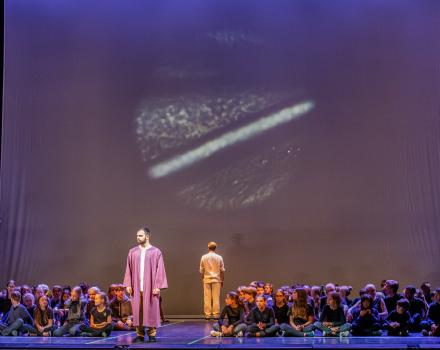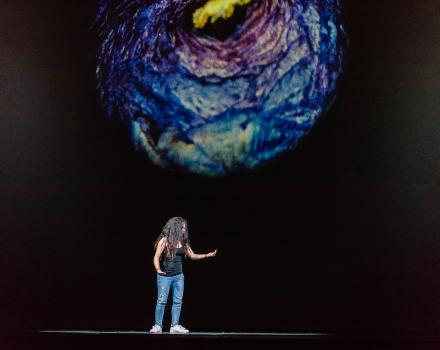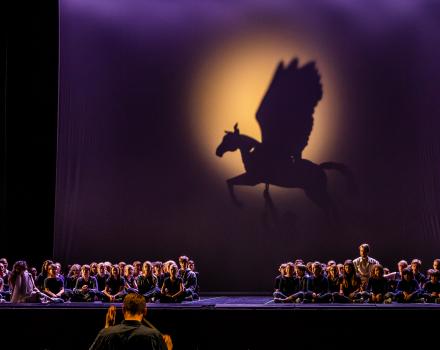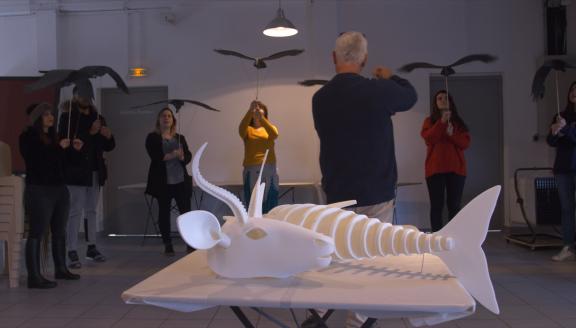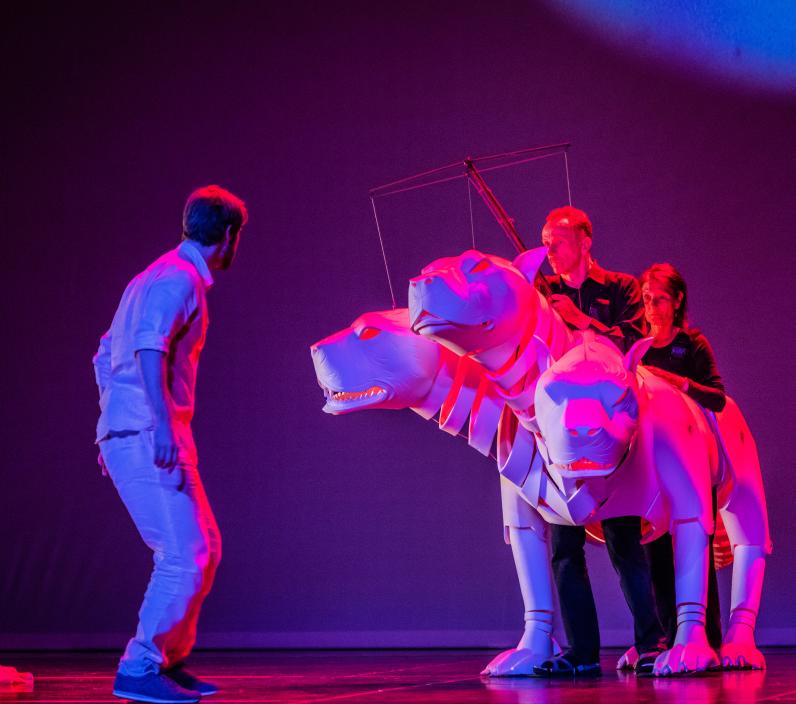

Orfeo & Majnun

Orfeo and Qays are two poets of legend who celebrate love and unity through music. Their songs resonate from East to West and back.
An ancient Greek myth intertwines with an oriental love story; Orfeo & Majnun is an intercultural and interdisciplinary project. It includes a parade in the streets of Aix-en-Provence with animal puppets and a performance streamed live on OperaVision from Aix’s famous Cours Mirabeau.
Cast
Eurydice | Judith Fa |
|---|---|
Layla | Nai Barghouti |
Majnun | Loay Srouji |
Orfeo | Yoann Dubruque |
Narrator | Sachli Gholamalizad |
Orchestra | Intercultural ensemble of the Mediterranean Youth Orchestra |
| ... | |
Music | Adwan / van der Harst / Moody |
|---|---|
Conductor | Bassem Akiki |
Director | Airan Berg, Martina Winkel |
Text | Martina Winkel |
Designer of the animals | Roger Titley |
Lighting | Luc Shaltin |
Video | Daan Milius, Martina Winkel |
Choreographer | Marta Coronado |
Chorus Master | Philippe Franceschi |
Chorus | Amateur choirs from the 'Passerelles' Eduction Departement |
| ... | |
Video
The story
The Narrator initiates the stage as space of storytelling and celebrates language as the expression of vital needs, emotions and, essentially human, of ideas and phantasies, while the choir scans basic words from various, even primal languages.
Conjured by the Narrator two young women, Layla and Eurydice, appear, singing about their dreams, wishes and their longing for love. When they incantate the names of their beloved, Orfeo and Qays answer to their calling and enter the space.
The choir is pondering about existential questions. Orfeo and Qays, the two poets, offer their poetry as a possible answer, singing about love as centre of the world and about the unifying power of music. Enchanted by their songs animals are lured out of the wilderness to listen peacefully, and even Pegasus, the mythical winged horse of inspiration, appears.
The Narrator invites the two couples to remember the begin of their love stories. Eurydice and Orfeo recall their first meeting with mysterious and romantic undertones; Layla and Qays remember how they met in school and fell in love at first sight.
Their innocent relationship is threatened by the strict rules of society and honour. Layla’s father takes her back home, while Qays cannot cope with the separation: he flees his home and, roaming nature, expresses his emotions in passionate poetry. In order to find healing for his son’s troubled mind Qays‘ father asks for Layla’s hand, but, listening secretly, Layla becomes witness to the refusal of this proposal by her father, who calls Qays „majnun“, crazy, and therefore unfit for marriage.
Majnun, as the desperate young poet is called from now on, retreats to the wilderness, leading an ascetic life. Layla’s image is evoked by a gazelle, whom he saves from the hunter‘s blow. He frees the graceful animal and sends it to Layla. A raven appears to him to be his companion in grief as the whole world becomes a mirror of his love.
Layla feels trapped between the wish to flee her confinement and the fear of disgrace and social punishment. She answers to Majnun’s love poems, which are sung by everybody, with poems of her own, throwing them into the wind. Meanwhile wild animals have started to follow Majnun and, tamed by his goodness, share his life.
Layla’s father marries her off to a noble young Arab of great wealth, while she is still dreaming of Majnun. Eurydice, a much happier bride, celebrates her marriage with Orfeo, accompanied by the wedding choir of her friends.
But the Narrator turns into a messenger of doom: first he informs Majnun of Layla’s wedding, then he tells Orfeo the shocking and surprising news of Eurydice’s sudden death. While the funeral choir carries Eurydice’s body in, Orfeo vows to follow her to the realm of Hades, the God of the ancient Greek underworld.
At the border between the world of the living and and the dead Orfeo encounters Charon, the ferryman shipping the dead across the river of the underworld. Despite his ironic questions Charon is impressed by the passion and beauty of Orfeo’s mourning, and so is Cerberos, the threeheaded mythical watchdog. They let Orfeo pass and the singer continues his journey to the Otherworld.
The Narrator brings Layla’s invitation for a secret rendezvous to Majnun. The two lovers meet at night in a garden, but Majnun accuses Layla of unfaithfulness. She convinces him of her true heart, but asks him not to come too near. Both are torn between the longing for love and its sublimation in purity, until Majnun runs away.
Excited, Eurydice tells the emblematic story how Orfeo convinced the gods of the underworld with his passionate singing to give her back to him and to life. While she is supposed to just follow him he has to fulfill the rule not to look at her before both will have reached the upper world. Eurydice, changed by the experience of death, is longing for her new life, but maybe for a different, more independent one than before.
Layla recalls the early death of her husband, who out of love had given in to her brave refusal of conjugal rights. While everybody assumes she is mourning her dead husband, she finally can shed tears for Majnun without hiding them.
Exhausted by her emotional stress Layla is dying, telling her mother the secret of her everlasting love for Qays called Majnun. Parallel to her fever phantasies Orfeo and Eurydice are on their way up from the realm of death. As Eurydice does not answer his increasingly urgent questions he can not bear the uncertainty of her presence any more and suddenly turns to look at her. Immediately Eurydice tumbles down and vanishes, while Layla is dying in the arms of her mother.
In the utmost isolation of their mourning Majnun and Orfeo express their grief, suffering and loneliness.
At this darkest moment the Narrator takes over again, while the animals and the choir gather around the two devastated lovers and poets. The Narrator tells how Orfeo, though surrounded by the friendly beasts, was ripped apart in ecstasy by the worshippers of the God Dionysos. Orfeo and Majnun themselves, joined by Eurydice and Layla, finish their stories: Majnun died at Layla’s tomb and was then buried together with her, united in death and in paradise, while Orfeo, against all odds, was given Eurydice back again by the god of love.
Orfeo’s lyre, according to the myth, was turned into a stellar constellation, and the craters of the recently discovered asteroid Eros are named after the starcrossed lovers. While the choir and the singers praise the power of love, the question remains, why this love in stories and reality often is hindered by obstacles rather than find fulfillment. Inmidst the hymn of love the narrator is calling for a change of our minds for the sake of love.
Synopsis written by Martina Winkel
Insights
4 things to know about Orfeo & Majnun
1° About the project
The opera Orfeo & Majnun emerges out of a community project led by La Monnaie and the Festival d’Aix-en-Provence. The two stories at its hear - Orfeo and Eurydice and Leïla and Majnoun - emerged from different cultures, varied musical styles and languages.
Orpheus and Eurydice are mythological characters from Ovid’s Metamorphoses. The Leïla and Majnoun legend was written by the Persian poet Nizami in 1188.
The opera is multilingual: Orpheus and Eurydice sing in English, Layla and Majnun in Arabic, and a female narrator tells the story in French.
Two directors work on this project, Airan Berg and Martina Winkel. Three composers, each of whom specialized in a different kind of music, worked together on the score, which can be described as a fusion of Western and Middle Eastern styles of music and singing : British composer Howard Moody, French-Palestinian composer and singer, oud-player Moneim Adwan and Dutch composer Dick van der Harst. Roger Titley is responsible for the creation and manipulation of the imposing animal puppets.
Gallery

